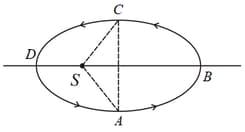EASY
Earn 100
How many planets are there in the Solar System?
Important Questions on Our Earth
EASY
Which satellite is used for geographical survey?
EASY
Why do tail of comets formed, when it comes closer to sun?
MEDIUM
EASY
What is the name of thick bright layer around the sun?
EASY
Which of the following is not a natural satellite?
HARD
EASY
EASY
Mention any two achievements of Hubble Telescope.
MEDIUM

EASY
EASY
The earth takes year to make a complete revolution around the sun whereas Pluto takes nearly of our earth years to orbit the sun. What is the main reason for this?
HARD
MEDIUM
What is an artificial satellite? Name any two types of artificial satellite and state their functions.
MEDIUM
MEDIUM
